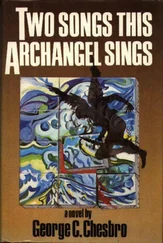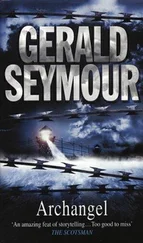The sky was an even, soft gray that day, so windless that clouds of tiny flies hung in the air as if set on a shelf, and the water was shallower than it had been during even the hottest June days. Gingerly he crossed the new rim of soft silt and watched his feet disappear in the murky water. Quiet, quiet. He trailed his net back and forth with no expectation of anything unusual. When he pulled it up, two fish, dully pale, almost translucent, with nothing but blank, scaled skin where the eyes should have been, were caught in the fine mesh. Ghost fish, nightmare fish. He stared at them so long they began to gasp. Then, trying not to touch them, he dropped the net and ran to the barn, where Taggart and Ed were tinkering with a gear meant to improve the connection between an aeroplane’s front landing wheel and the rudder.
“They’re still alive, then!” Taggart said. He set down a wrench, hopped on his motorcycle, and buzzed off, returning a few minutes later with Miss Atkins riding behind him. By then Constantine was back at the pond along with Ed, avoiding the hovering clumps of flies and eager to show off what he’d found.
“It’s a miracle they haven’t been eaten yet by some other creature,” Miss Atkins said, apparently thrilled. She patted Constantine’s arm as she spoke. “And a miracle you didn’t scare them off. I thought they’d be especially good at sensing any movement.”
“I don’t know,” he said. “I couldn’t help disturbing the water with my net.”
“You were lucky, then,” she said. She’d already put on her cotton pants, and now she rolled her skirt around her waist and stepped into the water armed with her own net. “Shall we try again? If we could see them, and see if they’ve changed …”
Not a word about what he should have done, suddenly so obvious: stow the fish in one of the traps before rushing off to find the adults. How could he have been so foolish? He flushed as Miss Atkins swept the water, bringing up minnows, catfish, newts, twigs, a swallow’s corpse, a slimy horn, everything but the blind fish, who might never have existed, or never been caught by him.
“Maybe if you try?” she said, handing the net to him.
Obediently he stepped into the water and swept. If he were one of those fish, he’d be on the other side of the pond by now, hiding behind a root or sheltering in a hollow, every place invisible to him. The boy was a movement, his net was another; the boy was a set of vibrations that would reveal — what did he seem like, to the fish?
As Miss Atkins turned toward him, startled, and both Taggart and Ed shouted his name, he lay down in the water, head submerged and eyes tightly closed, concentrating on what he could feel and hear. Small currents, slight changes in temperature. Sounds, more than he’d imagined. Of course the fish could sense him coming. So too could his uncle; last week, when he’d asked if he could stay in Hammondsport and earn his keep by doing chores, go to school with Miss Atkins and train to work with the mechanics on engines for the motorcycles or even for the flying machines, Taggart hadn’t been surprised at all. His face had gone completely smooth and whoever had been about to join them at the weighing station — Ed or Beryl, he couldn’t be sure from the footsteps — had stopped and backed away.
“Your mother needs you,” Taggart had said. Which meant that they’d talked, brother and sister, more than Constantine knew. And that Taggart might know something about his father’s rages and the way that, on those boiling summer days when the sun refused to set in the sky, the wind refused to blow and the clouds wouldn’t form, when the apartment steamed and smelled as badly as the inside of the sweltering factory, his father turned on him. No one, his father said, could blame him for having a few drinks in a cool bar: and who was Constantine to look at him that way? What happened afterward was bad enough that, even his first summer at Uncle Harry’s, he guessed why his mother had sent him away. But when the heat broke his father’s rages abated, and then his mother needed him around. To help with the girls, he’d assumed. But also, Taggart had said, “It changes things, when you’re there.”
If he went home, his uncle had said, for just a while longer, until he finished high school and his sisters were older, he could come back to Hammondsport then and live at the farm and work wherever he wanted. Or maybe his mother and sisters would come as well. Either way would be wonderful. Faintly — he had years ahead of him, years and years in which to explore everything here — he heard Miss Atkins calling his name.
The Ether of Space (1920)
There was a lot of chitchat, to start. Some the usual — Owen’s health, the weather in London, a tactful acknowledgment of the tenth anniversary of Michael’s death — but some not: Owen’s sister was heading to Russia with a group of Quaker relief workers, his nephew was working for her old teacher at Cornell, his paper on variable stars would be published in the spring. But where was the crucial news?
Across the ocean, at her desk in her bedroom in her parents’ house in Philadelphia, Phoebe Wells Cornelius scanned the pages of her friend’s letter impatiently. Last March, after the fighting had stopped, some British astronomers had quickly organized an expedition to view the eclipse. At two different stations along the path of totality, despite clouds in the Gulf of Guinea and a distorted mirror in Brazil, they’d photographed stars in the neighborhood of the sun. The results had been presented in November, at a meeting in London that Phoebe had been in no position to attend, and since then — nearly two months; it was already January, not just a new year but a whole new decade — she’d been waiting for Owen to supplement the sketchy, sensational newspaper articles with some firsthand observations.
We were all squeezed into the meeting room at Burlington House; the pews were packed and there were people standing behind the last row and in the anteroom. The usual eminences from the Royal Society and the Astronomical Society — J. J. Thomson, Fowler, Lodge, Silberstein, Jeans, etc. — but also the philosopher Whitehead, several reporters, and many I didn’t recognize: about 150 of us, so many the room was steaming despite the wintry day. Dyson spoke first, summarizing the work of the expeditions and then describing the photographs in the most enthusiastic terms, despite the lack of data. He claimed there was no doubt that they had confirmed Einstein’s prediction: the sun’s gravitational field had been shown to bend the rays of starlight in accordance with his law of gravitation.
But Dyson’s words don’t really explain it — it was more the tone, the feeling in the room. I wish you’d been there. Half of us sighed as the other half gasped, some thrilled and some appalled and some split between the two; the older members were really upset. I could feel — well, I’m not sure what that was. Something that shook me. I took notes as fast as I could, trying to get not only the Astronomer Royal’s tabulated values but Dr. Crommelin’s description of conditions in Brazil during the eclipse and Professor Eddington’s comments on the difficult weather. I noticed that Eddington had discarded many observations, but we’ll see what’s really there when the full report is published a few months from now. I do believe that Einstein’s theory is correct, but I’m not sure these results support it as definitively as they’re claiming.
The report on the meeting in the next day’s Times was typically muddled regarding the mathematics and said nothing, after these years of denouncing all things German, about the oddity of celebrating the work of a German scientist. In fact an article on the same page announced the King’s call for two minutes of silence during the anniversary of the signing of the Armistice. I went with my sister to the cenotaph that day, and when eleven struck and the guns went off, the crowd fell silent. The traffic stopped too, and the trains, and the Tube, people stood still in the shops, stood up at their desks — I wept like everyone else and thought: I’ve never seen anything like this. Although later, I realized that, at Burlington House, I’d had a similar sense of being present at a — what do you call these? A discontinuity, a rift? In one case torn by grief and in the other by wonder.
Читать дальше












